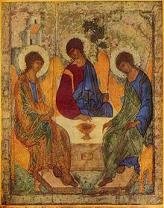 As I shared in the last issue of this article, the Arian heresy began when Arius refused to accept Alexander’s formulations about Jesus. If the Son, Arius exclaimed, possesses the same divine nature as the Father – is “consubstantial” with him – then “the Father is compound and divisible and alterable and a body, and according to them presumably, the bodiless God is though of as suffering what belongs to a body.”
As I shared in the last issue of this article, the Arian heresy began when Arius refused to accept Alexander’s formulations about Jesus. If the Son, Arius exclaimed, possesses the same divine nature as the Father – is “consubstantial” with him – then “the Father is compound and divisible and alterable and a body, and according to them presumably, the bodiless God is though of as suffering what belongs to a body.”
The Father, Arius insisted, cannot share his divine nature with another. He is by definition simple (not made up of parts) and indivisible (incapable of division into parts). Hence, whoever and whatever the Son is, he cannot be The eternally God, uncreated and consubstantial with the Father. Some other definition regarding the Son will have to be formulated, and Arius appoints himself for the task.
“What is it that we say, and think, and have taught, and teach?” Arius asks Eusebius.
That the Son is not unbegotten, nor a part of the unbegotten in any way, nor formed out of any substratum, but that he was constituted by “God’s will and counsel, before times and before ages, full of grace and truth, divine, unique, unchangeable. And before he was begotten or created or ordained or founded, he was not. For he was not unbegotten. We are persecuted because we say, “The Son has a beginning, but God is without beginning.” For this we are persecuted, and because we say, “he is made out of things that were not.” But this is what we say, since he is neither a part of God nor formed out of any substratum. For this we are persecuted, and you know the rest.
Frankly, Arius seems to want his cake and to eat it, too. On the one hand, he wants to affirm that the Son is in some way divine. On the other hand, if Arius is to preserve God’s simplicity and indivisibility, he must affirm that the Son has a beginning, even if he posits this as a beginning outside of time as we know it. Arius asserts, then, that the Son was “begotten timelessly by the Father and created before ages and established.” Arius admits that the Son is utterly unique – “He alone was constituted by the Father – yet the Son is “neither eternal nor coeternal nor co-unbegotten with the Father, nor does he have his being together with the Father.”
